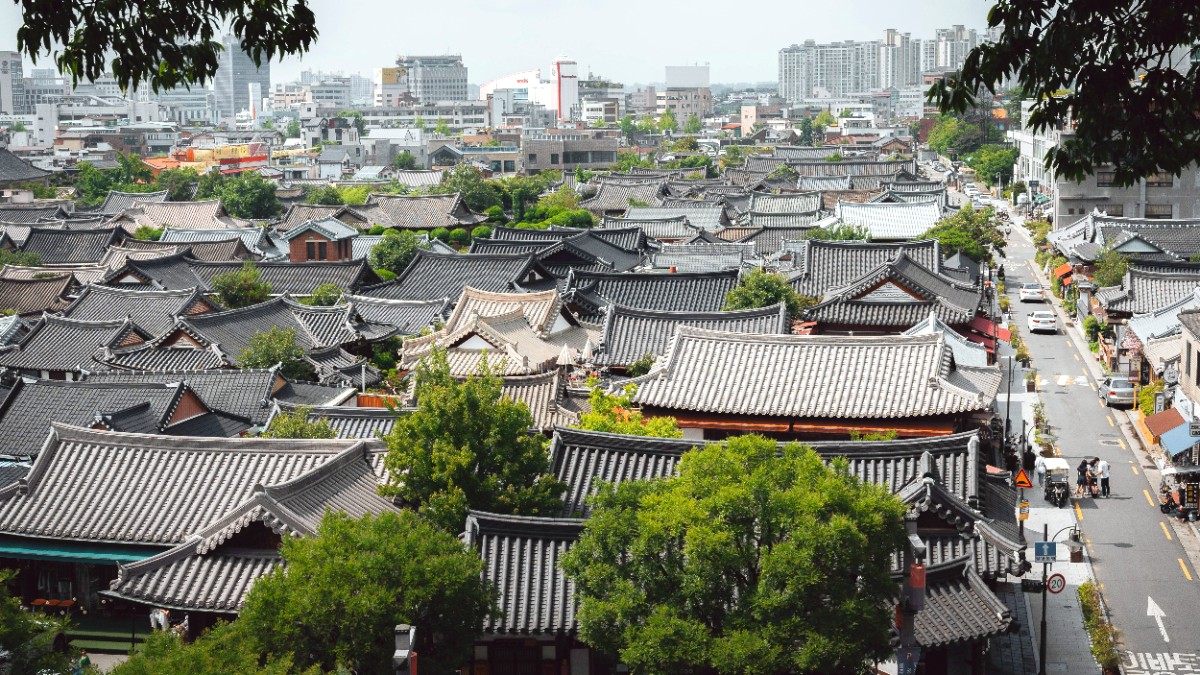
Jeollabuk Do, South Korea
Jeonju's cuisine presents a refined form of traditional Korean cooking. Its connection to the Joseon royal court fostered a focus on high-quality ingredients, meticulous preparation, and beautiful presentation.
The fertile plains and coastal proximity contribute to a rich pantry, while fermented pastes like Gochujang and Doenjang are fundamental. The city's food culture emphasizes balance and visual appeal.
Rice is the foundation. Vegetables include Namul (bean sprouts, spinach, bracken). Beef, pork, and chicken are widely used.
Seafood, especially Jeotgal (fermented seafood), plays a role. Flavors are savory, often spicy, with deep umami.
Gochujang (chili paste) and Doenjang (bean paste) deliver distinct Korean flavors and umami depth.
This famous dish features warm rice topped with Namul (vegetables), Gochujang, beef (often Yukhoe), and a raw egg yolk. Visually appealing and flavorful.
Jeonju-style uses beef tartare, ginkgo nuts, and pine nuts. Rice is often cooked in beef broth, served with Kongnamulguk.
A hearty, spicy, and restorative soup made with bean sprouts (Kongnamul), rice, and often a raw egg. Some versions include seafood.
A popular local hangover remedy. Enjoy Samadae Kongnamul Gukbap or Hyundaeok's unique style with crispy fried seaweed.
Jeonju is famous for its Makgeolli Alley, where ordering rice wine brings a generous array of complimentary side dishes (Anju).
The more makgeolli kettles ordered, the more diverse the food spread becomes. A social and gastronomic experience.
Gogung Bibimbap and Hankook Jib are well-known for traditional Jeonju bibimbap. Gajok Hoegwan is noted for quality ingredients.
Nambu Market's Night Market offers an incredible array of street food, including skewers, fried items, and PNB Choco Pies.
High-end restaurants offer elaborate traditional Korean set meals (Hanjeongsik) for a luxurious experience.
Abundant options around the Hanok Village and downtown specialize in signature dishes like bibimbap.
Nambu Market is essential for budget-friendly, authentic food, especially its night market.
Finding strictly vegetarian/vegan options is challenging; many dishes use meat/fish broth, and Banchan often contain seafood.
Use Papago app for phrases like '저는 고기 안 먹어요' (I don't eat meat) or '저는 채식주의자예요' (I am vegetarian).
For truly vegetarian/vegan food, explore 'temple food' (사찰음식), often found in temple stay programs.
Focus on simple, unprocessed foods. Convenience stores offer more controlled choices with ingredient lists.
Korean cuisine relies on soy sauce (wheat) and fermented pastes, making gluten-free choices difficult due to likely cross-contamination.
Halal and Kosher options are extremely limited outside major international cities.
Prepare translated allergy cards in Korean for clear communication with staff.
A Korean-English dictionary or phrasebook focusing on food terms is useful.
Order makgeolli by the kettle and receive a vast array of complimentary side dishes (Anju).
A social and authentic Korean drinking experience, unique to Jeonju.
This historical bakery is famous for its handmade Jeonju Choco Pie, an iconic souvenir.
Visit the bakery for a fresh taste of this local delicacy.
Beyond Bibimbap, explore Pajeon (savory pancakes) and Kongnamul Gukbap (bean sprout soup).
Savor traditional teas in Hanok Village tea houses or try local Soju.
Finding strictly vegetarian/vegan options is challenging; many dishes use meat/fish broth, and Banchan often contain seafood.
For truly vegetarian/vegan food, explore 'temple food' (사찰음식), often found in temple stay programs.
Utilize translation apps like Papago to communicate effectively with restaurant staff.
Navigating gluten-free or other severe allergies in Korean cuisine is very difficult outside major international hubs.
Focus on simple, unprocessed foods where ingredients are clearly identifiable.
While some restaurants in major cities might have allergen information, it is not common in smaller local eateries.
Assume potential cross-contamination in smaller local kitchens.
Held annually in October, this major festival celebrates the city's signature dish with cooking competitions and tastings.
Other smaller food events and local markets might occur during different seasons. Check the Jeonju tourism website for current event calendars.
These festivals offer insights into Jeonju's food culture and traditions.
Tipping is not customary in South Korea. Prices are fixed.